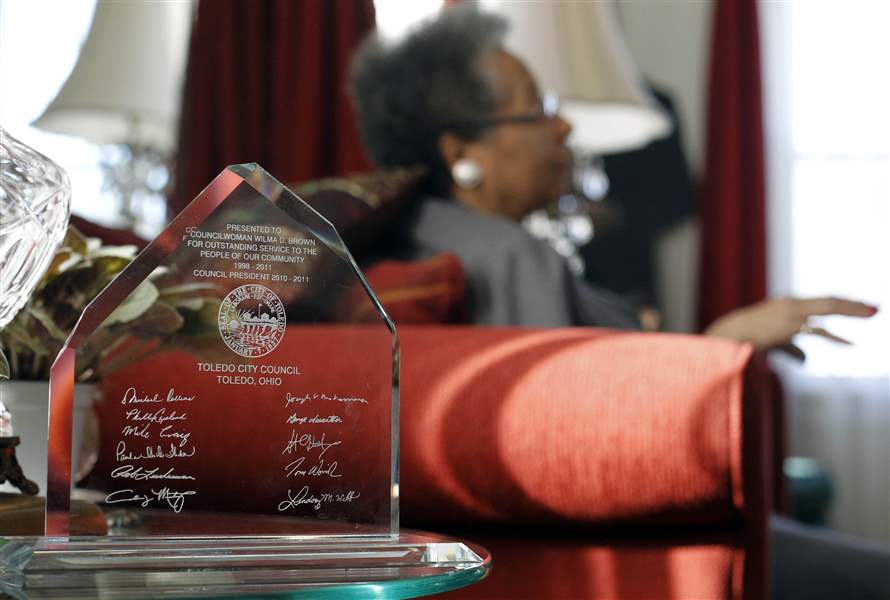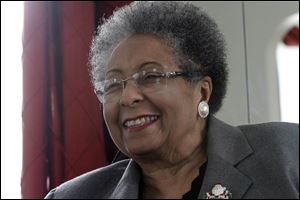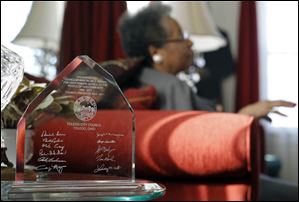
1st female leader of council leaving busy life of politics
12/31/2011
Wilma Brown, Toledo's first female African American council president and long-time public official, is stepping down.
The Blade/Amy E. Voigt
Buy This Image

Wilma Brown, 76, has represented District 1 in Toledo City Council the last 14 years and served as council president the last two years. She is retiring because of term limits.
After a decades-long career in politics and education, one might assume that Wilma Brown could use a break.
But the 76-year-old Toledo city councilman, who steps down Saturday as representative for District 1 and council’s first ever female president, said leaving her busy routine behind will not be easy.
“It’s going to be traumatic not having to worry about getting up, going downtown, getting phone calls, [looking at what’s] going to be on the agenda, getting a call from the administration, or just going out looking for things that need taking care of,” Ms. Brown said during a recent interview at her home on Searles Road. “I’ve got to do something. It bothers me not having to get up to do things.”
Ms. Brown, who is retiring because of term limits, has represented District 1 for 14 years.
She has been an advocate for revitalizing her district’s main commercial corridor, Dorr Street, and a crucial conduit between neighborhood residents and developers.
As council president for the last two years, Ms. Brown became the chief arbiter among her colleagues and between council and Mayor Mike Bell’s administration.
She’s come a long way since arriving in Toledo with her mother as a 14-year-old girl from Birmingham, Ala.
Back then, Ms. Brown dreamed of becoming a clothing designer, and neither the city nor politics interested her.
That changed over the years as Ms. Brown grew to love Toledo and its people.

Wilma Brown, Toledo's first female African American council president and long-time public official, is stepping down.
After graduating from Scott High School, she stayed in the city to work as a seamstress and later found her way into a career with the Maumee Valley Girl Scouts Council, from which she retired as membership director after 23 years. A passionate believer in education, Ms. Brown also was a member of the Toledo Board of Education from 1987 to 1997.
Her introduction to politics started when she became a volunteer for state Rep. Casey Jones (D., Toledo), a leading black politician in the area. Ms. Brown, who did not grow up in a political household, said she found the experience fascinating.
In 1997, at the behest of the Democratic Party, she ran for Toledo City Council, and has since been reelected twice.
Having the power to make things happen, and the ability to work with many different people and organizations to get there, is an opportunity Ms. Brown said she has relished.
“I’m the type of person that if I see something that needs to be done, I’m going to try to do something about it,” she said. “Everybody wants to say, ‘Oh, this is terrible, this is not right,’ or whatever. But they’re not doing anything to make it better.”
Her primary focus as a councilman has been on revitalizing the stretch of Dorr that runs through her district.
Once a bustling business corridor for Toledo’s African-American community, Dorr was eviscerated by building demolitions during the urban-renewal push of the 1970s. Since that time, Ms. Brown, who became enamored with the street’s vibrancy when she first stepped off the bus there as a girl, has been determined to bring it back to life.
Since taking office, Ms. Brown has orchestrated improvements along the entire corridor, from repaving to beautification efforts and the preservation of green space.
She has helped bring businesses and development to the area, including a Walgreens near Reynolds Road and a group of townhouses known as the Brownstones, and established the Secor Gardens Task Force to help facilitate ties between that community and the adjacent University of Toledo.
Matt Schroeder, vice president of real estate and business development at The University of Toledo Foundation, said Ms. Brown’s efforts have been fundamental in establishing trust between the university and neighboring communities. Ms. Brown has helped the university with its development plans, among those the Dorr Street Gateway Project, a shopping and residential complex now under construction at Dorr and Secor Road.
“From the university’s perspective she’s just been not only a wonderful ambassador for her constituents, but she’s been able to bring the university and the community closer together,” Mr. Schroeder said. “She’s very forward thinking, she’s very passionate, and at times she’s very bold. And that’s what the university and the surrounding communities need.”
As council president, Ms. Brown became well known for what her colleagues refer to as “the look.” The stern, disapproving gaze she employed during council meetings was enough to silence an overly loquacious councilman or to impart a quiet message of displeasure with an argument or request.
Councilman Lindsay Webb counts herself as one of the most frequent targets of Ms. Brown’s “look.”
“It certainly was something that I couldn’t avoid,” Ms. Webb said. “She didn’t take any nonsense. … That look is kind of what kept people in line.”
Ms. Webb and Councilman Paula Hicks-Hudson, council’s two remaining women, said Ms. Brown set an example of strong female leadership.
“She came up through the ranks, so to speak, and just to see her persevere and end her career as president of council I is a great testament to her personality and who she is,” Ms. Hicks-Hudson said. “She’s a strong woman who knows her mind. She says what she means, she doesn’t play around with that. She’s very truth-telling and principled.”
Mr. Bell, too, praised Ms. Brown for her ability to keep council in check, and to find common ground between council members and his administration.
He said Ms. Brown was able to bring councilmen on board with controversial issues such as budget cuts and privatizing trash collection. Referred to as Mr. Bell’s “second mother” by his parents, who are long-time friends of Ms. Brown, the councilman has also offered him advice, he said.
“She’s always been a good listener,” the mayor said. “She’s a very good person, very kind, very calming. But she could be stern when she had to be.”
Councilman D. Michael Collins, however, a vocal opponent of privatizing trash collection, criticized what he saw as Ms. Brown’s deference to the mayor.
“She allowed the administration far more control of the legislative process than would have been appropriate,” Mr. Collins said. “Friendship [with the mayor] should not compromise one’s official responsibilities. And she would give deference to the mayor on issues that required debate.”
Ms. Brown, who has worked under three mayors, said she was not afraid to let Mr. Bell know when she disagreed with him. But ultimately, she said, it is the mayor who runs the city.
Contemplating her future, Ms. Brown said she would remain involved in helping her district and answering constituent calls.
She said she will continue to support development along Dorr and is confident her successor, Tyrone Riley, will do the same.
Ms. Brown said she also will continue her work with the Debutante Cotillion, a group that tries to give high school girls a sense of social etiquette and offers them college scholarship money.
“I want to make sure these kids get an education,” she said.
Contact Claudia Boyd-Barrett cbarrett@theblade.com or 419-724-6272.